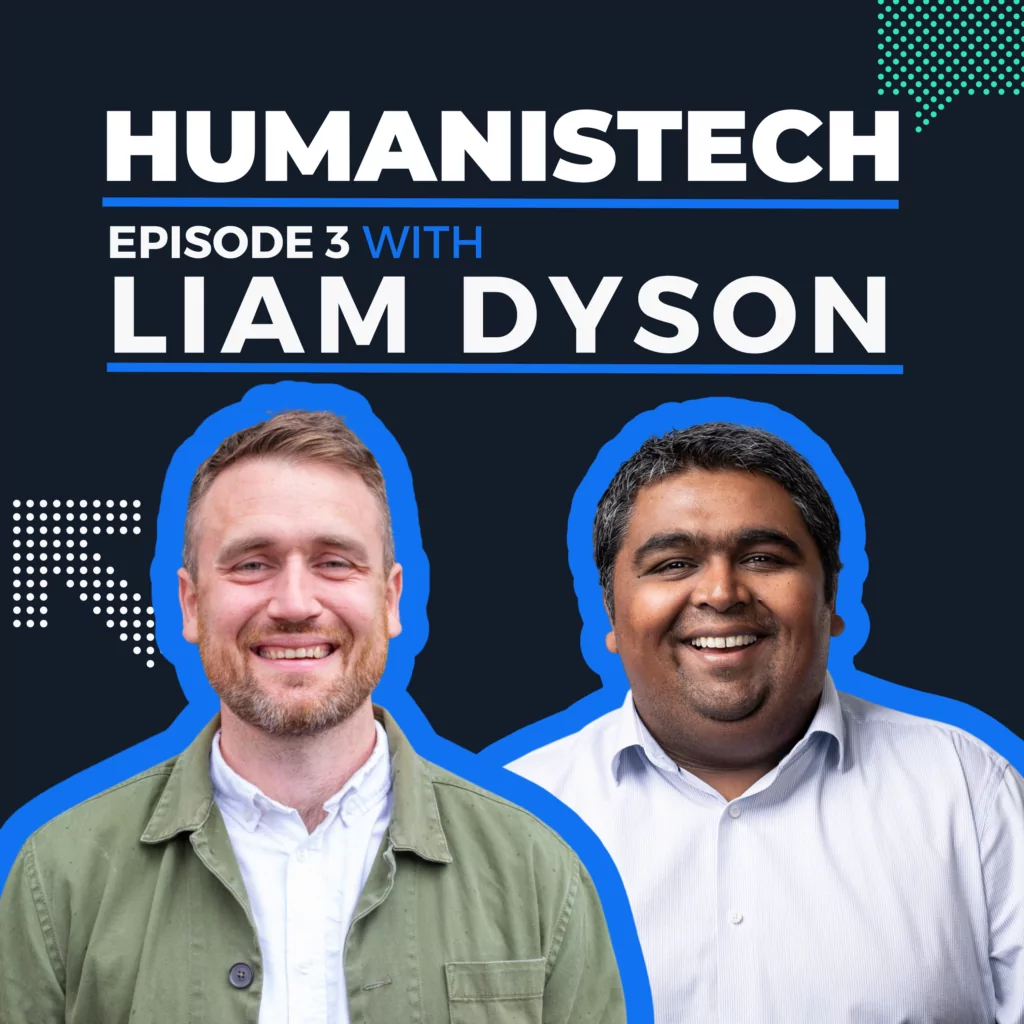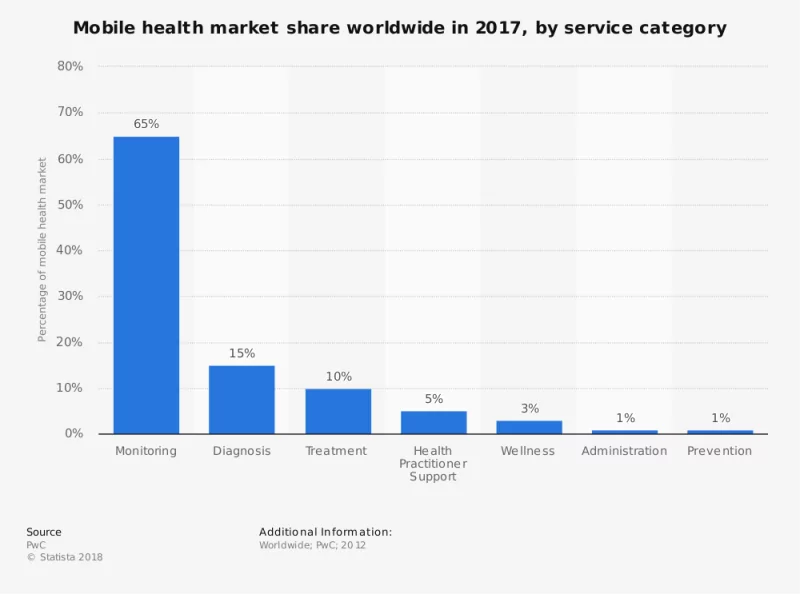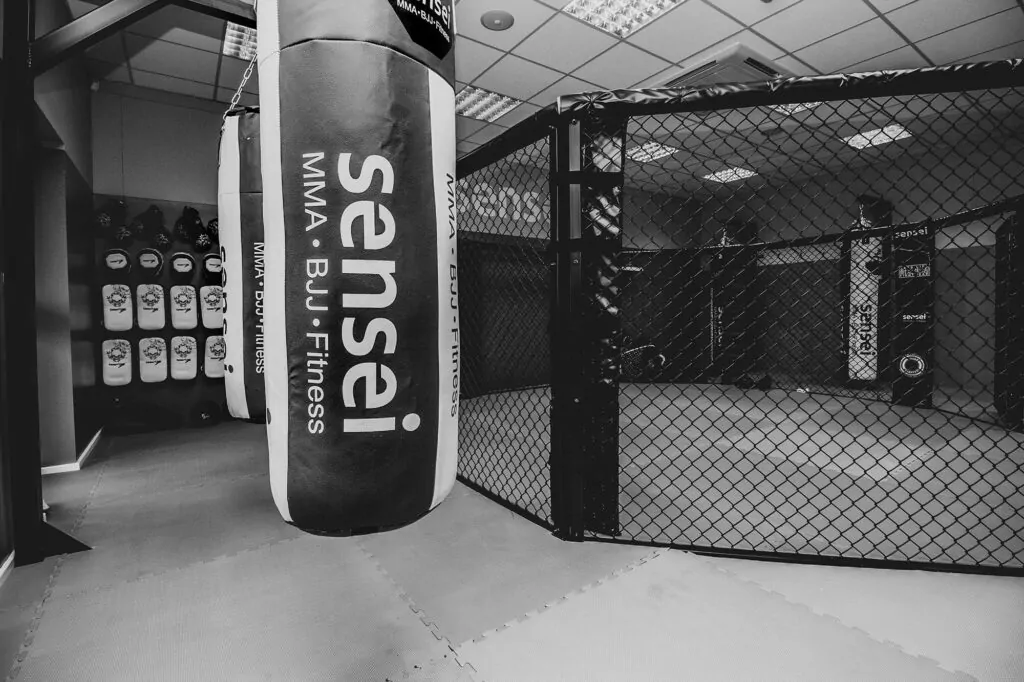Experts have made no secret of mHealth’s potential to revolutionise the way we access healthcare. In 2018 alone‚ the market is expected to account for a gargantuan $28bn – and that is a figure expected to grow annually‚ by a CAGR of 30%.
The Global Observatory for eHealth defines mHealth as a component of eHealth; medical health practices supported by mobile devices (such as mobile phones‚ wearables and more). mHealth solutions tend to leverage core functions of mobile technologies such as voice interactivity and SMS‚ as well as their connectivity.
But despite market analysis that suggests an exciting future for mobile health‚ further investigation reveals a sector still be in development. In 2017‚ the market remained dominated by solutions designed to monitor health‚ with 65% of available products designed for tracking.
Source: Statista
The remaining third of the market is taken up by products for diagnosis‚ treatment‚ practitioner support‚ wellness‚ admin and prevention. The dominance of monitoring is logical in an industry that is currently in transition‚ looking to switch focus from options that generate masses of data to those that use it to deliver more actionable‚ relevant insights.
Our interest around‚ coverage of and involvement in mHealth is quite extensive. Most recently‚ we re-imagined healthcare‚ identifying what the sector would look like as a centralised‚ data-powered system. We can also speak from experience‚ having delivered projects such as DiabetIQ and Mindz.
mHealth for mental health
Having identified how wearables are set to become more health-focused‚ we’ve touched upon the shift required to use mobile technologies more effectively in health offerings. So instead‚ we thought we’d take a look at how users are interacting with mHealth currently.
What followed was research into the favourite apps of the hedgehog lab team. The survey reaffirmed the dominance of mHealth for monitoring‚ with 96% of the team’s favourite apps falling under the category of such a platform. MyFitnessPal and Samsung Health proved the most popular products‚ with a combined share of 44%.
Interestingly‚ the only app mentioned outside of monitoring was Headspace‚ a wellbeing platform offering guided meditation and mindfulness. The brand has recently hit the headlines after unveiling plans for Headspace Health‚ a ‘prescription-level’‚ agency-approved mobile solution aimed at tackling specific conditions. The company are already working with the NHS to research how meditation can treat 12 physical and mental health issues.
![[object Object] [object Object]](http://images.ctfassets.net/o6514hijae09/2K0cOdTBkvIepiEmp4agwM/ed6bf7056e658dfbad9600021f012496/ben-kolde-470581-unsplash.jpg)
Photo by Ben Kolde on Unsplash.
In 2016‚ the World Health Organisation issued an alarming call-to-action having recognised a frightening shortfall in treatment options on a global scale. The report estimated that without a scalable improvement‚ between 2016 and 2030‚ businesses would lose twelve-billion working days to depression and anxiety: that represents over £650bn of losses to the global economy and fifty million years worth of work.
However‚ in more positive news‚ it was also found that no matter the economic status of the nation‚ there’s a positive correlation between the amount invested in treatment and economic return. But while $1 of investment returned an average of $2.50‚ it was also found that global average treatment spend per annum sits at just $1.50.
The business case for investment in mental health seems pretty clear. But despite research suggesting poor mental health to be the most common reason for taking time off work‚ and the topic being more openly discussed than ever before‚ there’s still a feeling that while companies are now better at speaking about mental health issues‚ they’re still inept at tackling them.
![[object Object] [object Object]](http://images.ctfassets.net/o6514hijae09/70NXI8diDGfhqjuwXt1nnI/145826fdf0c0c5e18dae36cea1508c75/edited.jpg)
Photo by Jamie Street on Unsplash
Initiatives such as individual wellbeing plans‚ mental health training and flexi-time are among the most common investments in workplaces. But with mobile health solutions beginning to shift away from a focus on monitoring‚ a question quickly becomes apparent – could mental health care be the critical driver of mHealth’s predicted growth?
Can mHealth tackle mental health issues?
A pro-active approach can address usability as a problem before it ever becomes one. The key to preventing issues is to invest in design. Outstanding designers understand the influence decisions such as font choices can have in creating more comfortable user experiences and even creating trust – a vital feeling to evoke in a solution as personal as this. At hedgehog lab‚ we also have a UX research team‚ dedicated to ensuring that our products meet customer needs and desires in an easily-comprehendible manner.
While system integrations represent a challenge to the success of mHealth solutions‚ they also signify an exciting opportunity. As mentioned earlier‚ the World Health Organisation noted that the world is to take an economic hammering from mental-health sick days‚ because of the lack of a scalable solution.
Again‚ the key here lies in proactivity and does require early investment‚ this time in development‚ to guarantee quality scalability. As a company‚ we’ve expanded our capacity since the start of 2018‚ launching an Artificial Intelligence department. In addition to a speciality in machine learning and deep learning‚ we’ve also been upskilling our development team to better accommodate for projects that require integrations with third-party tools and APIs.
![[object Object] [object Object]](http://images.ctfassets.net/o6514hijae09/6sgIMSVyCD9lDZxfXGuBOo/b96b3151cb669e2fa44a09afce3da1f6/2a5d0e21067c72c5a0e2601509e1c8b39a9aeec1r1-2048-1347v2_uhq.jpg)
Photo by NeONBRAND on Unsplash
Data security and privacy are arguably more important than ever in products that can contain medical information. Again‚ the process of mobile project development lends itself handily to this. Extensive research before the development of projects should ensure that apps only collect data that is needed‚ that integrations are compliant with governing bodies (assisting in scalability) and that data storage and access are in line with legislation.
Network access provides a unique challenge in that it isn’t uniform across regions‚ let alone nations. mHealth solutions need to be scalable‚ and the unavailability of consistent network connections across countries can cause concern. However‚ 4G connectivity is growing globally‚ while the popularisation of 5G appears to be on the horizon. Additionally‚ talented developers can also build mHealth products capable of anticipating connection issues.
Mobile tends to naturally increase accessibility‚ especially when paired with network access. As such‚ well-being centred mHealth products can also be interactive‚ allowing users to connect with healthcare professionals remotely‚ maximising reliability. Additionally‚ advances in AI make options such as chatbots more knowledgeable‚ accurate and viable than ever before.
What next?
There has been progression on a human level‚ with increased discussion and awareness beginning to remove the stigma associated with mental health issues. However‚ evidence proves that immediate attention is still required if solutions that can limit or even start reversing the economic impact are to be released.
In many ways‚ the rise of mHealth appears perfectly timed as a combatant to the issues preventing diversification of the mental health care treatment options available that would lead to increases in availability and accessibility.
With the need for a range of well-being options so urgent‚ healthcare organisations should seek well-qualified technology consultancies to collaborate with. Doing so can help to accelerate the planning and development process‚ ensure scalability and ultimately address the biggest challenges all mHealth products face. If you’re looking to learn more about hedgehog lab’s capacity to do just that‚ get in touch.





